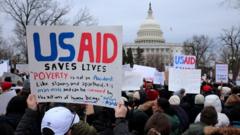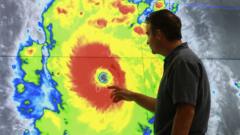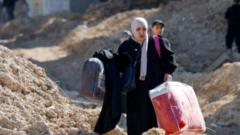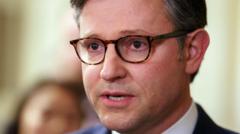**Former USAID Leaders and Organizations Warn of Global Aid Crisis Amid Major Overhaul**
**USAID Faces Drastic Cuts As Thousands Are Placed on Leave**

**USAID Faces Drastic Cuts As Thousands Are Placed on Leave**
**Controversial Measures Could Reduce Agency Staff to Just 294 Employees**
In a shocking move, the Trump administration is poised to dramatically cut the staffing levels of the U.S. Agency for International Development (USAID) from approximately 10,000 to fewer than 300 essential personnel worldwide. The decision comes as part of a broader initiative to slash government spending that has gained traction since Trump's return to the White House. With the clock ticking towards a midnight deadline on Friday, an overwhelming number of USAID employees, particularly those stationed abroad, are set to receive mandatory administrative leave notifications. The agency has issued alerts regarding travel arrangements for returning non-essential staff and contractors, underlining the severity of the proposed downsizing.
This unprecedented plan, reportedly driven by advisers including prominent tech figure Elon Musk, has stirred significant backlash from USAID's workforce and its leadership. The American Foreign Service Association (AFSA), representing many workers affected by the shake-up, has already initiated legal proceedings in response to what they deem a violation of both constitutional and federal law. The lawsuit contends that Congress holds exclusive authority over any movements to dissolve the agency, calling for immediate intervention to restore operational capabilities and provide clarity for employees fearing job losses.
Critics, including former USAID chiefs, have condemned the cuts, asserting that they jeopardize the United States' longstanding commitment to international humanitarian efforts. Gayle Smith, a former agency leader, voiced her concerns about the implications of drastically reducing USAID's footprint, proclaiming that such actions send troubling signals about U.S. priorities on global welfare. Congress members, NGOs, and humanitarian workers across the globe have echoed these sentiments, emphasizing the detrimental impacts expected in regions heavily dependent on U.S. aid.
Despite assurances from Secretary of State Marco Rubio that the administration remains committed to foreign aid, he stressed that future programs must align closely with U.S. interests. The ramifications of this significant shrinkage of USAID could be dire; individuals reliant on life-saving assistance are already experiencing disruptions in critical services. Community leaders from impacted regions articulated feelings of uncertainty as vital programs have been frozen, leaving many questioning what aid, if any, will be restored in the future.
As the clock ticks down to the anticipated implementation of these measures, pressure is mounting from various sectors to reevaluate the sweeping cuts and consider their long-term consequences on both international relations and global public health.
This unprecedented plan, reportedly driven by advisers including prominent tech figure Elon Musk, has stirred significant backlash from USAID's workforce and its leadership. The American Foreign Service Association (AFSA), representing many workers affected by the shake-up, has already initiated legal proceedings in response to what they deem a violation of both constitutional and federal law. The lawsuit contends that Congress holds exclusive authority over any movements to dissolve the agency, calling for immediate intervention to restore operational capabilities and provide clarity for employees fearing job losses.
Critics, including former USAID chiefs, have condemned the cuts, asserting that they jeopardize the United States' longstanding commitment to international humanitarian efforts. Gayle Smith, a former agency leader, voiced her concerns about the implications of drastically reducing USAID's footprint, proclaiming that such actions send troubling signals about U.S. priorities on global welfare. Congress members, NGOs, and humanitarian workers across the globe have echoed these sentiments, emphasizing the detrimental impacts expected in regions heavily dependent on U.S. aid.
Despite assurances from Secretary of State Marco Rubio that the administration remains committed to foreign aid, he stressed that future programs must align closely with U.S. interests. The ramifications of this significant shrinkage of USAID could be dire; individuals reliant on life-saving assistance are already experiencing disruptions in critical services. Community leaders from impacted regions articulated feelings of uncertainty as vital programs have been frozen, leaving many questioning what aid, if any, will be restored in the future.
As the clock ticks down to the anticipated implementation of these measures, pressure is mounting from various sectors to reevaluate the sweeping cuts and consider their long-term consequences on both international relations and global public health.






















